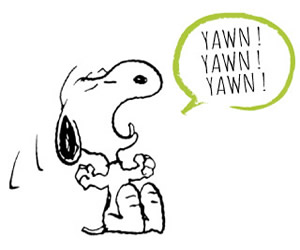
From those exaggerated and almost comical to the tired ones which arrive, inevitable, at the sound of the alarm; from the cuddly baby ones to the bored ones of the students: yawns, as you know, are contagious and you will certainly arrive at the end of this article with a strong desire to make one! But why do we yawn? For sleepiness, strain or starvation? Although everyone, absolutely everyone yawns, there are not any shared theories on the causes of this reflection. But what are the most reliable ones? What is the real motivation that brings us to yawn?
We all do it. From morning to night, about 7-8 times a day. Almost 220,000 times in our lifetime. Yawning does not take long: it takes only 6 second! On the contrary, the organs involved that affect the respiratory system (and not only) are different: a yawn dilates the pharynx, larynx, chest, nose and mouth.
This reflex, "conditional " or " unconditional ", was born with life. It is shown, in fact, that by the 11 weeks of pregnancy, the fetuses show contractions of the mouth accompanied by a lowering of the tongue which lasts a few seconds. Not only that, even animals yawn: dogs , cats , mice , snakes , fish , birds are very similar to us.
Not only that, even animals yawn: dogs , cats , mice , snakes , fish , birds are very similar to us.
But what do we yawn for? What happens when we yawn?
Strange to say, but such an everyday and universal phenomenon has never been analyzed properly, perhaps because of the difficulty of being reproduced in a laboratory.
The yawning theories
Some theories include the possibility that the yawn is a reflex triggered by the same neurotransmitters (serotonin in particular) that act in the brain, affect emotions, mood, appetite, and other aspects of our lives. Some even claim that yawning is a way to communicate apathy (hence the contagiousness of the gesture), sharing the behavior and the physiological state of whom surrounds us. Others believe that it may be a reflection of unconscious imitation, which is the basis of human learning (as happens in language acquisition), or of a non-verbal communication tool to report to the members of the group our tiredness, synchronizing the sleep-wake rhythms. Still yawning is not just an expression of boredom, drowsiness or strain. For example, according to a recent study, it is an intelligent mechanism to cool the brain. In short, a process of homeostasis, which allows us to recover a physiological balance. Other studies emphasize the function of respecting the levels of oxygenation of the blood in response to an excess of carbon dioxide.

These and other theories, are a clear example of how complex the physiological mechanisms that regulate various body functions, are; for this reason, next time you see someone yawn, you will not think of it as a simple sign of tiredness! You have yawned, right?
1. In the case of overloaded work, the brain warms up: the temperature drops thanks to yawning.
2. Some drugs, such as those which treat Parkinson’s disease, can cause yawns. As it happened to Giovanni Paolo II, who in later years suffered from this disease.
3. There is a connection among three phenomena: yawning, orgasm and sneezing. All three (controlled by the same nerve, the vagus) produce a similar feeling of wellness tied to a brief loss of contact with reality.
4. For many mammals yawning acts as a "synchronizer" of sleep / wake cycles of the community. In particular, the yawn of a dominant male can also indicate to the group that it is time to go to
sleep.
